| | | | | | | Presented By OurCrowd | | | | Axios World | | By Dave Lawler ·Mar 31, 2022 | | Welcome back to Axios World. This week's edition (1,908 words, 7 minutes) looks at the gaps in the global vaccination effort, Russia's remaining friends, elections in Hungary, and more. ☪️ Ramadan Mubarak to all those celebrating. | | | | | | 1 big thing: Vaccine rollouts have hardly started in some countries |  Data: Our World in Data; Chart: Jared Whalen/Axios Vaccine supply struggles are easing, but in 44 counties — most of them in Africa — less than 20% of the population is fully vaccinated. In 19, the rate is under 10%. The big picture: Those countries "have doses now, and they know that there are more doses available," says Seth Berkley, CEO of the Gavi vaccine alliance and point person for the global COVAX initiative. After a year of waiting for doses, the primary concern is now delivery. State of play: Africa CDC director John Nkengasong last month asked countries to pause vaccine donations until the second half of the year. - Rather than a sudden glut of vaccines, he said African countries need steady, predictable shipments that can be used before they expire.
This week, Nkengasong laid out four key challenges to rolling out shots: - Inadequate storage facilities to preserve vaccines.
- Transport and logistical issues in terms of getting doses and supplies, like syringes (which often aren't included with donations), to remote locations.
- Shortages of health care workers to administer shots.
- Vaccine hesitancy.
Breaking it down: Berkley says storage is now less of a limiting factor thanks to improved cold chains and deployment of non-mRNA vaccines in harder-to-reach areas. The other challenges vary country to country, requiring COVAX to tailor "bespoke plans." - In Nigeria, for example, the focus is on coordinating deliveries at the state level. In Tanzania, political will was the main factor, though that is changing.
- In many countries, the top priority is to hire, train and pay health workers.
- Vaccine hesitancy is also a much bigger factor than in previous vaccination campaigns that Gavi has run successfully in countries like the Democratic Republic of the Congo. Berkley blames social media and "the politicization of the vaccine in the West."
By the numbers: Berkley notes that 15 countries have hit the 10% vaccination threshold just since January, while the overall vaccination rate across the 92 low- and middle-income COVAX countries has climbed to 42% (compared to 58% globally and 66% in the U.S.). - But it varies widely, from 80% in Vietnam and 64% in Nepal to less than 1% in Burundi and the DRC.
- In some "very fragile countries" like Niger, South Sudan, Syria and Yemen, it will take significant time and funding to meaningfully increase coverage, Berkley says.
- COVAX is "rationing the last money we have," but it will seek $1 billion for vaccine delivery at a fundraising event next week.
What's next: While the WHO has set a goal of 70% vaccination for every country, around half of the countries COVAX is working with have set lower targets, Berkley notes. - He says the focus should be on protecting vulnerable people and the capacity of health care systems, rather than ending the spread altogether.
- Thus, even in countries with relatively low vaccination rates, COVAX will prioritize boosters for vaccinated but high-risk people over first shots for the general population.
What to watch: Case counts in Africa and elsewhere are currently relatively low, and fatigue with the virus is high. The pandemic is also competing with other priorities. - "Complacency is a huge problem right now" for both governments and the general public, Berkley warns.
View the interactive map. |     | | | | | | 2. Russia is isolated from the West, but not the rest | 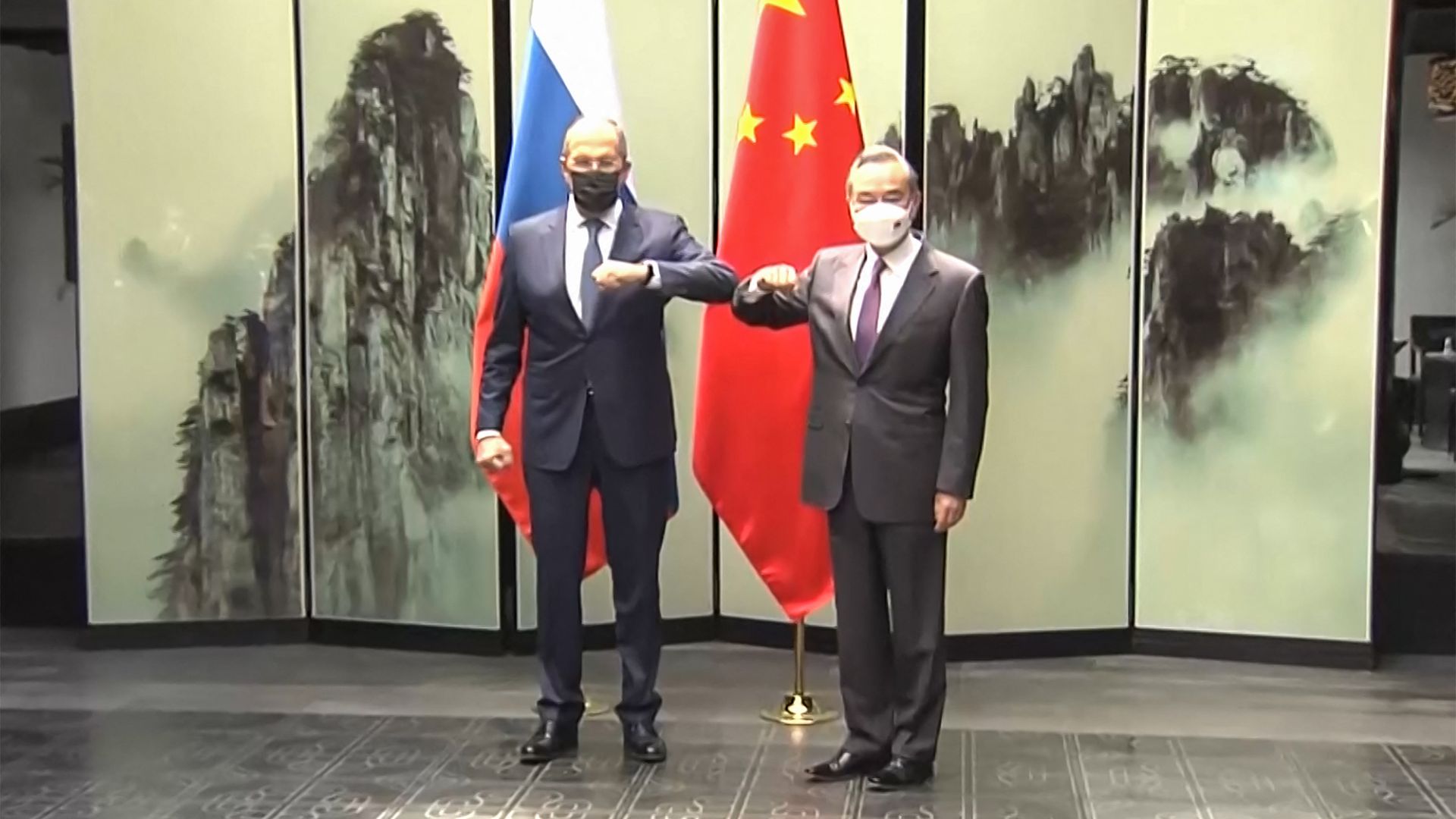 | | | This screenshot taken on March 30 from video by state broadcaster China Central Television via AFPTV shows Russian Foreign Minister Sergei Lavrov (left) meeting his Chinese counterpart Wang Yi. Photo: CCTV/AFP via Getty Images | | | | Foreign Minister Sergei Lavrov's friendly visits to the world's two biggest countries — India today and China yesterday — suggest that Russia is not as isolated as President Biden's rhetoric might suggest. Why it matters: As Lavrov was traveling to Delhi, the U.S. and Australia criticized India for discussing a rupee-ruble trade arrangement with Russia, which could undermine Western sanctions. - While in China, Lavrov said Russia, China and other like-minded countries would "move towards a multipolar, just, democratic world order."
Meanwhile, OPEC countries today elected to stand by a deal with Russia rather than comply with U.S. pressure to increase production. - Leaders from countries including Brazil, Pakistan and South Africa, have signaled their reluctance to join in any anti-Russia blocs.
- While the sanctions on Russia are crippling, they're limited mainly to NATO members and other close U.S. allies like Australia, Japan and South Korea.
More Ukraine headlines: Worthy of your time: Five of Ukraine's MPs — all women — left Kyiv this week for Washington, but only long enough to ask in person for more help before heading back into danger. Go deeper. |     | | | | | | 3. Orbán's Putin ties under scrutiny as Hungary election approaches | 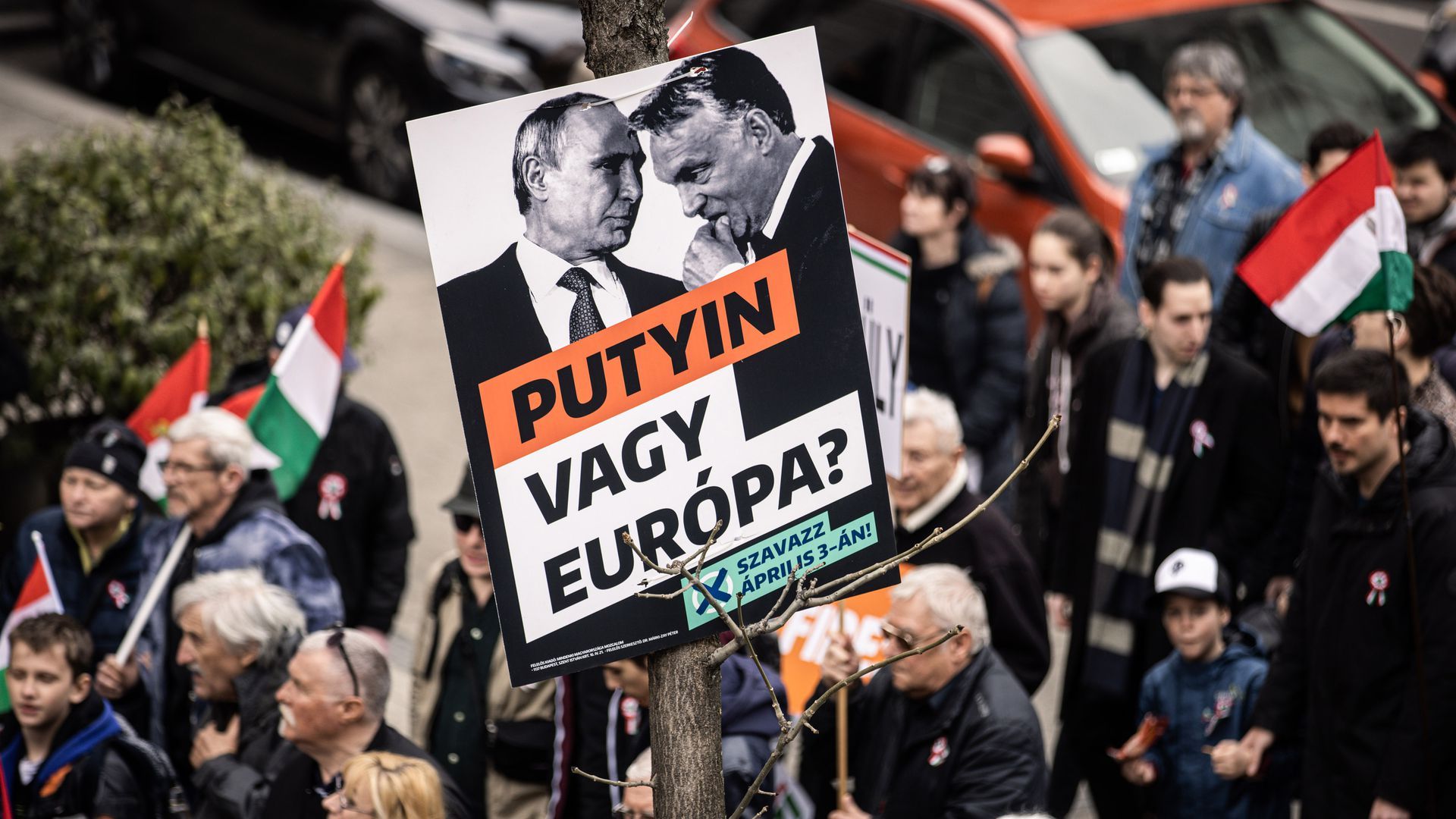 | | | A poster depicting Putin and Orbán during a Fidesz party freedom march in Budapest, Hungary, on Tuesday, March 15. | | | | Hungary's foreign minister this week accused Ukraine of coordinating with opposition parties to interfere in April 3's parliamentary elections, further straining relations between Kyiv and the most pro-Russian government in the European Union, Axios' Zach Basu writes. Why it matters: Prime Minister Viktor Orbán, an icon for the global right who has transformed Hungary into a self-styled "illiberal democracy," faces his toughest election bid since returning to power in 2010. - Polls show his party ahead by around 5% against a broad coalition of opposition parties that joined forces in a desperate bid to defeat him.
- With support for neighboring Ukraine running high, Orbán's close ties with Vladimir Putin and his spoiler role inside the trans-Atlantic alliance have come under new scrutiny in the final stretch of the campaign.
The big picture: Orbán has walked a tightrope. He's accepted EU sanctions on Russia and welcomed more than 360,000 refugees, but refused to allow weapons to be transported across Hungarian territory and ruled out sanctions on Russian energy. - That's led Ukrainian President Volodymyr Zelensky to refer to Orbán's Hungary as a "Russian branch in Europe" while urging EU leaders to "stop listening to the excuses of Budapest."
- "Our moral responsibility is not for Ukraine. I don't have to face the Lord for Ukrainians, but for Hungarians. I must consider the Hungarian interest," Orbán has said in response to criticism.
- He has accused the opposition of "warmongering" for wanting to send weapons to Ukraine and called himself the "peace candidate."
Orbán's intransigence is isolating Hungary even from its right-wing allies in central and eastern Europe. - A meeting of the central European "Visegrad Group" was canceled this week after Poland and the Czech Republic pulled out to protest Hungary's war response.
- Polish President Andrzej Duda, an erstwhile Orbán ally, said this week that Hungary's approach to Russia's aggression was "hard for me to understand" and would be "very costly for Hungary."
Between the lines: While the Hungarian people generally have empathy for Ukraine's plight, Orbán's control of 80% of the national media will help his message cut through, says Anna Orosz, an opposition candidate running in Budapest. - The opposition is still hopeful for an outright win on Sunday, but would also consider denying Orbán a parliamentary supermajority to be a victory.
|     | | | | | | A message from OurCrowd | | FoodTech titan's new company makes healthier, better tasting juice | | | 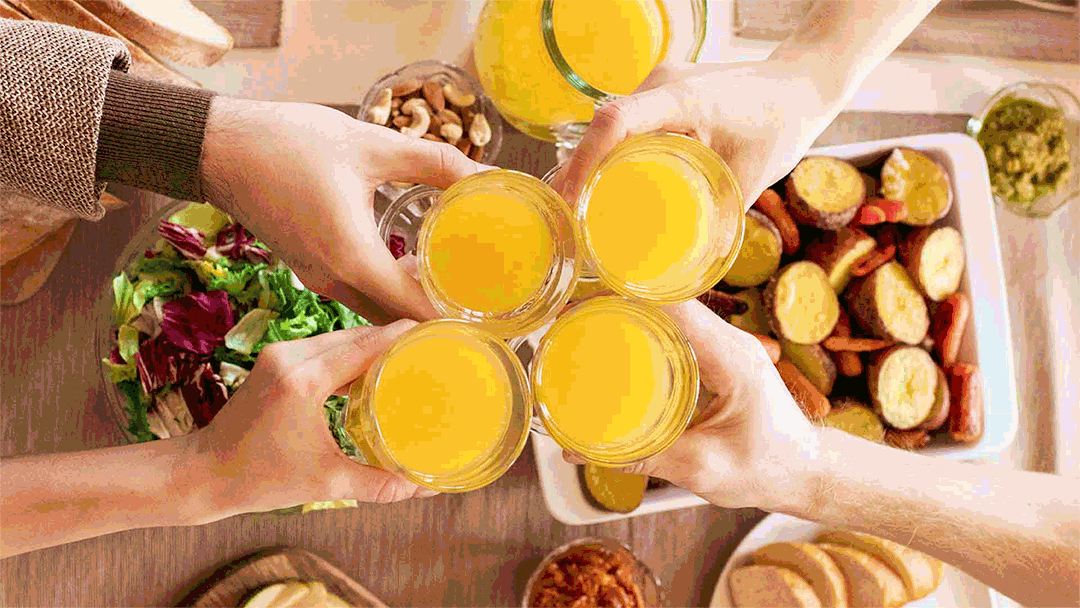 | | | | The health benefits of many natural drinks could make them superfoods, but high sugar content holds them back. Until now. BlueTree's process removes up to 50% of sugar in any natural liquid while retaining great taste. Sugar increases the risk of obesity, cancer and diabetes. Learn more. | | | | | | Bonus: Where in the world? | | Let's visit some modern places that used to have different names. How it works: I give you the old name, you give me the current name. - Countries: 1. Abyssinia; 2. Burma; 3. British Honduras; 4. Ceylon; 5. Dutch East Indies; 6. Siam; 7. Southern Rhodesia; 8. Swaziland; 9. Upper Volta; 10. Zaire.
- Cities: A. Constantinople; B. Edo; C. Leningrad; D. Peking; E. Saigon.
|     | | | | | | 4. Global news roundup | 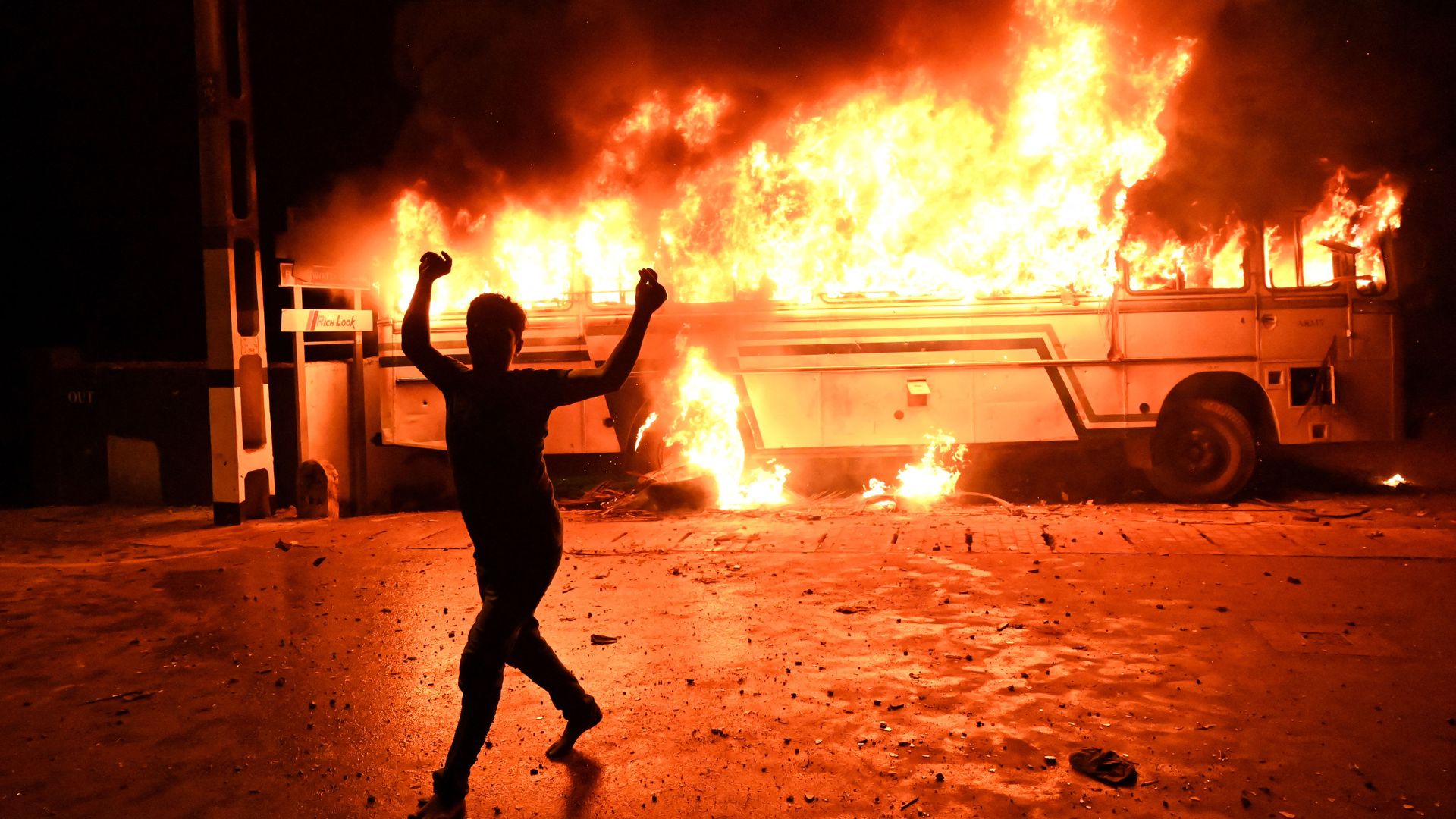 | | | Sri Lankan authorities imposed a curfew after protesters, angry over the country's deepening economic crisis, attempted to storm the president's residence on Thursday. Photo: Ishara S. Kodikara/AFP via Getty Images | | | | 1. Costa Rican voters will choose their next president Sunday in a tight race between former banker Rodrigo Chaves and former President José María Figueres. - State of play: Polls show a virtual dead heat.
2. The prime minister of the Solomon Islands is defending a possible security deal with China that Western allies and regional leaders fear will lead to Beijing building a military base in the island nation. - What he's saying: "We find it very insulting to be branded as unfit to manage our sovereign affairs," Manasseh Sogavare told Parliament this week. "We are not pressured in any way by our new friends and there is no intention whatsoever to ask China to build a military base in the Solomon Islands."
3. International donors today pledged about $2.44 billion for aid in Afghanistan — a little more than half of the UN's record $4.4 billion request. - Driving the news: Some 95% of Afghans don't have enough to eat and 9 million are at risk of famine, according to the UN.
"People are already selling their children and their body parts, in order to feed their families. ... Wealthy, powerful countries cannot ignore the consequences of their decisions on the most vulnerable." — UN Secretary-General António Guterres said at the beginning of the high-level pledging event. 4. Serbian President Aleksandar Vučić is expected to win another five-year term as voters head to the polls for the country's general elections. |     | | | | | | 5. A Nicaraguan exodus |  Data: U.S. Customs and Border Protection; Chart: Simran Parwani/Axios More Nicaraguans are fleeing their country than in past years, seeking refuge in neighboring Costa Rica as well as in the U.S. and Mexico, writes Axios Latino co-author Marina E. Franco. Why it matters: The Nicaraguan exodus has ramped up as President Daniel Ortega and his wife, Vice President Rosario Murillo, have again cracked down on dissent. - Ortega and Murillo were declared winners of widely criticized elections in November, after most other candidates were jailed.
By the numbers: Customs and Border Protection has encountered over 63,000 Nicaraguans at the U.S. border this fiscal year, more than during all of FY2021, according to agency data. - The UN warned recently that the sharp increase means the Costa Rican asylum system could soon be overwhelmed, while arrivals in Mexico have climbed by 300%.
Read more. |     | | | | | | 6. One to watch: Tough talk at EU-China summit | 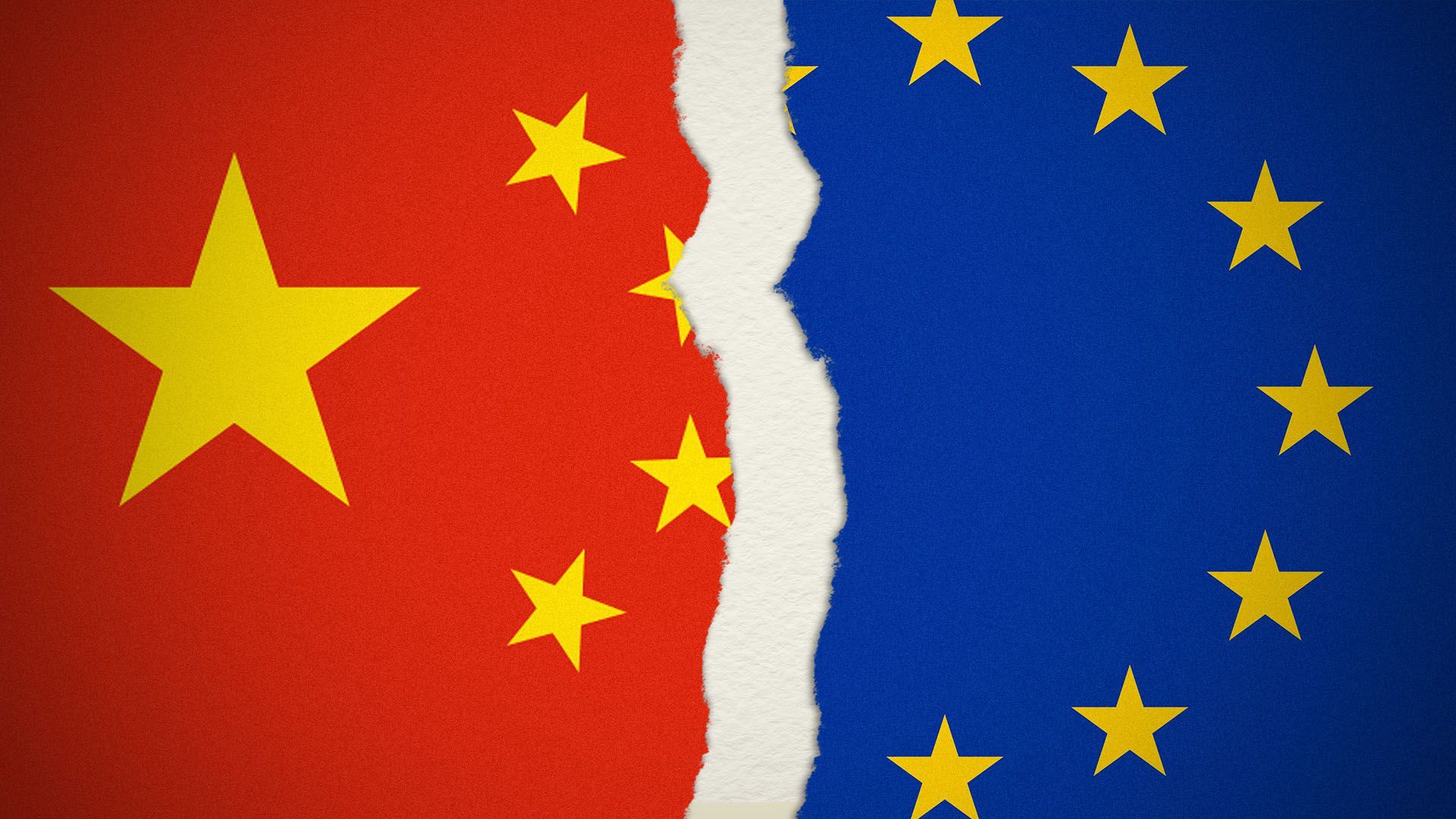 | | | Illustration: Shoshana Gordon/Axios | | | | Tough talk on Russia will supplant "shared interests" like cooperation on climate and health on the agenda tomorrow at the EU's long-awaited leaders' summit with Chinese President Xi Jinping, Zach writes. What to watch: Ursula von der Leyen and Charles Michel — presidents of the European Commission and European Council, respectively — will use their face time with Xi to ensure Beijing understands the consequences of providing an economic lifeline to Russia, an EU official told Axios. - For its economy to continue to grow, China needs "relations between EU and China to be on a positive foot," the official told Axios, pointing to the enormous economic power of the single market while also underscoring how drastically the Brussels-Beijing relationship has changed in two years.
The big picture: The EU leaders will also push China to abandon its economic coercion of Lithuania, adopt international standards on forced labor, and withdraw its sanctions on EU parliamentarians. - The latter two are key sticking points holding up a landmark EU-China investment deal that was frozen last year. The deal already looks like a relic of a time when the EU thought close economic ties could coexist with geopolitical tensions.
- "We won't whitewash our differences with China," the EU official said. "Our citizens wouldn't expect our two presidents to behave this way."
Go deeper: Read Politico Europe's deep dive on expectations for the summit. |     | | | | | | 7. Stories we're watching |  | | | A giant Z, a symbol of Russia's invasion of Ukraine, hangs in the background of daily life in Moscow. Photo: Natalia Kolesnikova/AFP via Getty | | | - Prosecutor wants Khashoggi murder trial moved to Saudi Arabia
- Wave of terror attacks is Israeli PM Bennett's biggest test
- Peru's president survives impeachment vote
- U.K. officials fined for lockdown parties
- Seoul says North Korea's "new" missile was old
- China makes genetic data a national resource
- Biden meets parents of former Marine detained in Russia
Quoted: "We used to collaborate with the Chinese on a cure for cancer, and that was good, and now it's ... not good. And I'm not sure why." — A quote that stuck with me, from a former State Department official, in a New Yorker piece on the hunt for Chinese spies on U.S. campuses. |     | | | | | | A message from OurCrowd | | Cutting edge tech reduces sugar in juice without sacrificing taste | | | 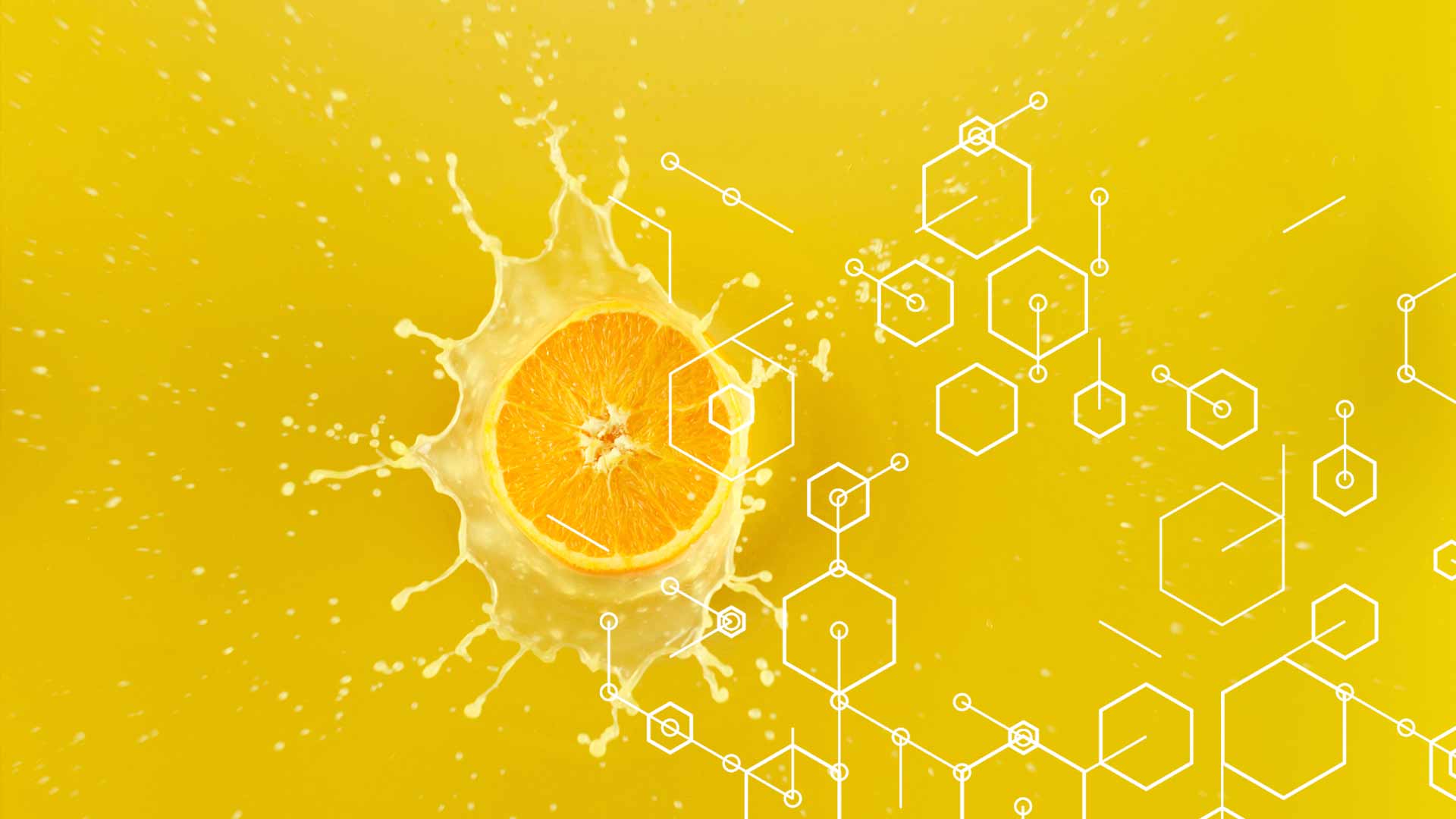 | | | | Sugar can increase the risk of obesity, cancer and diabetes. BlueTree's revolutionary process can reduce sugar in any natural liquid — from juice to beer, wine to milk and more — up to 50%. Led by esteemed industry vets, BlueTree is already slated to produce 20 million liters annually. Learn more. | | | | Answers: 1. Ethiopia; 2. Myanmar; 3. Belize; 4. Sri Lanka; 5. Indonesia; 6. Thailand; 7. Zimbabwe; 8. Eswatini; 9. Burkina Faso; 10. Democratic Republic of the Congo. A. Istanbul; B. Tokyo; C. St. Petersburg; 4. Beijing; 5. Ho Chi Minh City. |  | It's called Smart Brevity®. Over 200 orgs use it — in a tool called Axios HQ — to drive productivity with clearer workplace communications. | | | | | | Axios thanks our partners for supporting our newsletters. If you're interested in advertising, learn more here.
Sponsorship has no influence on editorial content. Axios, 3100 Clarendon Blvd, Suite 1300, Arlington VA 22201 | | | You received this email because you signed up for newsletters from Axios.
Change your preferences or unsubscribe here. | | | Was this email forwarded to you?
Sign up now to get Axios in your inbox. | | | | Follow Axios on social media:    | | | | | |












No comments:
Post a Comment